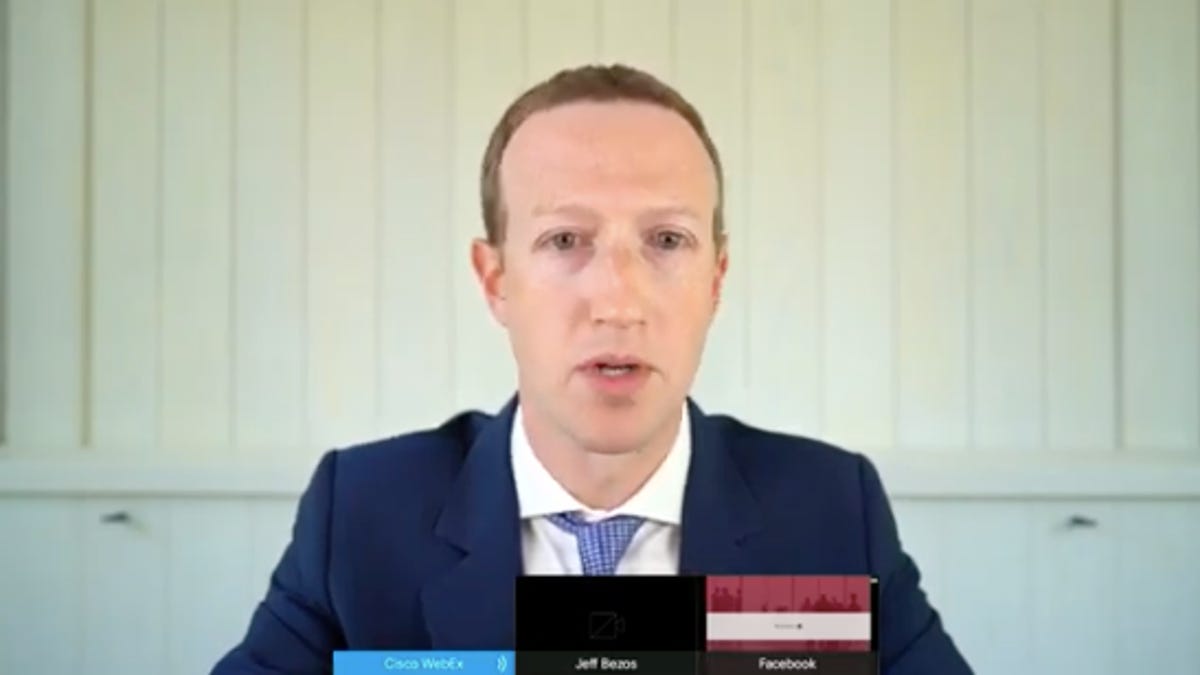Mark Zuckerberg saw Instagram as a threat to Facebook, emails show
Facebook's Instagram acquisition has been the focus of an antitrust probe into the company.

Facebook CEO Mark Zuckerberg testified via video before members of the House judiciary's antitrust subcommittee on Wednesday.
US lawmakers grilled Facebook CEO Mark Zuckerberg on Wednesday about the company's purchase of popular photo service Instagram , accusing the company of stifling competition by snapping up and copying its rivals.
During a lengthy antitrust hearing, members of the House judiciary's antitrust subcommittee pointed to emails sent by Zuckerberg in 2012 as evidence that the company saw Instagram as a competitive threat. The subcommittee has been gathering documents as part of an antitrust probe into the power wielded by big tech companies.
In an email sent in February 2012, Zuckerberg tells David Ebersman, who was the company's chief financial officer at the time, that he was thinking about how much money they would offer to buy up other mobile apps such as Instagram and Path that competed with Facebook.
"The businesses are nascent but the networks are established, the brands are already meaningful and if they grow to a large scale they could be very disruptive to us," Zuckerberg wrote in the email, which were released by House Judiciary Committee.
Documents from the Hearing on “Online Platforms and Market Power: Examining the Dominance of Amazon, Apple, Facebook and Google" pic.twitter.com/zcQDpSgLg4
— House Judiciary Dems (@HouseJudiciary) July 29, 2020
He then clarifies to Ebersman that he didn't mean to imply that Facebook would be buying Instagram and Path "to prevent them from competing in any way."
In another email, Zuckerberg agreed with a Facebook employee's assessment that Instagram and not Google Plus was a threat to the company.
"You were basically right," Zuckerberg said in an email. "One thing about startups though is you can often acquire them. I think this is a good outcome for everyone."
The Federal Trade Commission, which cleared Facebook's $1 billion acquisition of Instagram in 2012, is also reportedly looking into whether Facebook's acquisitions were part of the social media giant's strategy to stifle competition.
Facebook's critics, including one of its own founders, Chris Hughes, want the social network to spin off its acquisitions, including Instagram and WhatsApp , as separate companies.
Zuckerberg was asked about his 2012 emails repeatedly during the hearing. Rep. Jerrold Nadler, a New York Democrat, said the documents "tell a very disturbing story" in which Facebook purchased Instagram rather than compete with it.
"This is exactly the type of anti-competitive acquisition that the antitrust laws were designed to prevent," Nadler told Zuckerberg.
Zuckerberg said that he viewed Instagram as both a competitor when it came to mobile photo sharing and a complementary service.
"At the time, almost no one thought of [Instagram] as a general social network, and people didn't think of them as competing with us in that space," he said. The acquisition was "wildly successful," he said partly because Facebook invested in the app. Instagram has grown in popularity especially among teens, surpassing more than 1 billion users.
Rep. Jim Sensenbrenner, a Wisconsin Republican, said that Facebook's acquisition of Instagram passed the "smell test" by the FTC, but other lawmakers said that the FTC's approval doesn't alleviate the antitrust challenges that Democrats described.
At another point during the hearing, Zuckerberg was asked if Facebook would copy its competitors' features and use it as a threat when the company wanted to purchase its rivals.
Citing documents submitted to the committee, Rep. Pramila Jayapal, a Washington Democrat, said that Facebook cloned Instagram by releasing a camera feature and used that to pressure Instagram co-founder Kevin Systrom into agreeing to an acquisition.
"It was clear that this was a space that we were going to compete in one way or another, I don't view those conversations as a threat in any way," Zuckerberg said.
An online chat between Systrom and investor Matt Cohler shows that they both were worried that Facebook would go into "destroy mode" if Instagram didn't agree to join the company.
Jayapal also said that Facebook put the same pressure on Snapchat CEO and co-founder Evan Spiegel when the company was interested in purchasing the ephemeral messaging app. In another email she cited, Zuckerberg said the company "can likely just buy any competitive startups, but it'll be a while before we can buy Google ."
Documents from the Hearing on “Online Platforms and Market Power: Examining the Dominance of Amazon, Apple, Facebook and Google" pic.twitter.com/1o6TwV8k4k
— House Judiciary Dems (@HouseJudiciary) July 29, 2020
When asked about his past remarks, Zuckerberg said that he didn't recall writing them but "it sounds like a joke."

